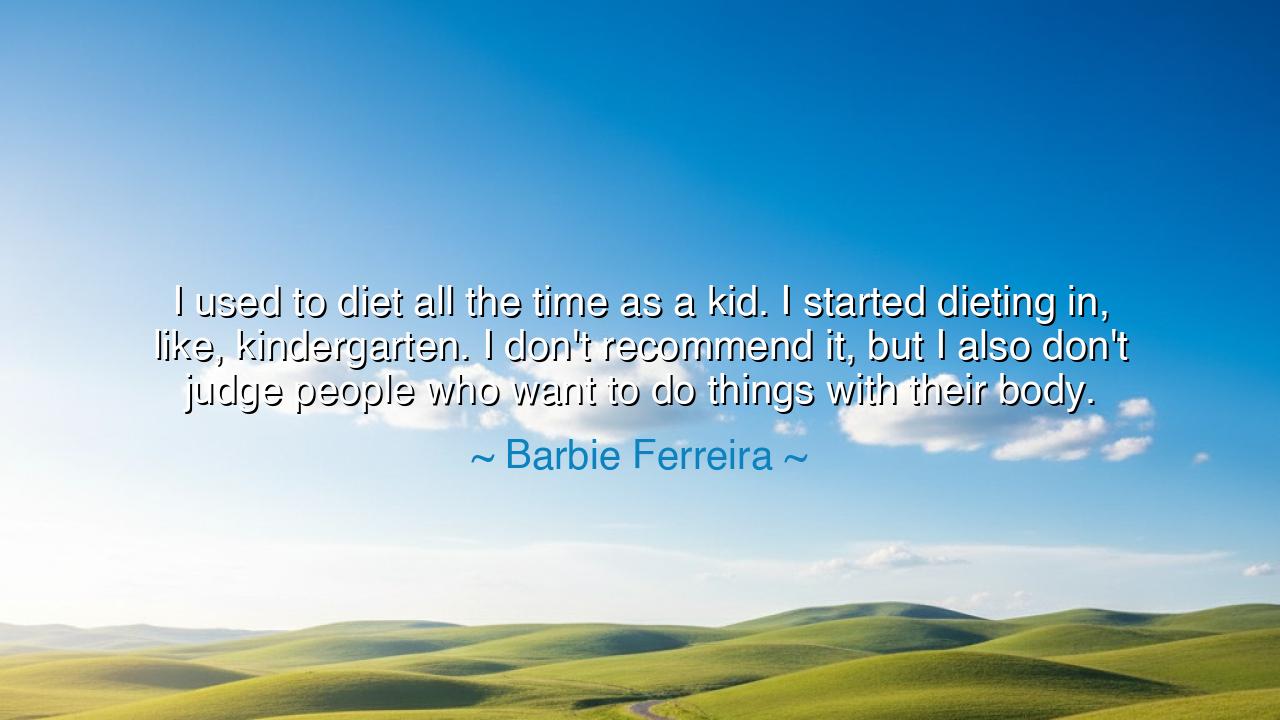
I used to diet all the time as a kid. I started dieting in, like
I used to diet all the time as a kid. I started dieting in, like, kindergarten. I don't recommend it, but I also don't judge people who want to do things with their body.






“I used to diet all the time as a kid. I started dieting in, like, kindergarten. I don’t recommend it, but I also don’t judge people who want to do things with their body.” — thus spoke Barbie Ferreira, a voice of honesty in an age obsessed with appearance. Her words echo with the sorrow and compassion of one who has lived through the quiet torment of self-denial and emerged wiser, gentler, and freer. Beneath this simple confession lies a profound truth about self-acceptance, judgment, and the long shadow that society casts upon the human body.
To begin dieting in childhood is to begin life already burdened by comparison. In Ferreira’s reflection, one feels both the ache of lost innocence and the power of self-awareness. The child who should have been learning wonder and play instead learns restriction and shame. She is taught that joy must be earned, that food is not nourishment but a measure of worth. Yet in her maturity, she does not speak with bitterness — she speaks with understanding. She has seen the cycle of judgment that binds both those who conform and those who rebel, and she chooses compassion over condemnation.
Her words remind us that the body — this sacred vessel of being — has too long been treated as a battlefield. Empires of fashion and media have told humanity that beauty has one face, one shape, one number. And so millions wage quiet wars against themselves, measuring their value by mirrors and scales. But Ferreira, like a prophet of modern grace, teaches that to truly live is not to conform, but to accept the body as one’s ally, not one’s enemy. Her refusal to judge others stems from wisdom: she knows that every person’s relationship with their body is a story written in pain, survival, and hope.
The ancients, too, knew the dangers of excess judgment and self-denial. The philosopher Epicurus, so often misunderstood, taught that moderation and joy — not restriction and guilt — were the paths to harmony. He believed that to nourish oneself well was not indulgence, but reverence for life. Even Siddhartha, before becoming the Buddha, nearly destroyed himself through extreme fasting in search of enlightenment. It was only when he ate — when he honored his humanity — that he attained awakening. Thus, Ferreira’s wisdom aligns with the eternal truth that balance, not deprivation, is the source of peace.
In speaking these words, Ferreira also honors the complexity of choice. “I don’t judge people,” she says, offering a lesson in empathy. She does not replace one form of dogma with another; she does not scorn those who still struggle. Instead, she embodies the compassion of the wise — those who understand that freedom cannot be forced. For some, the path toward self-love passes through control; for others, through release. To judge either path is to misunderstand the journey of becoming.
The origin of her insight lies in the crucible of her own experience. As a child, she was shaped by an image of beauty that demanded conformity. Yet as she grew, she discovered that liberation is not found in reshaping the body, but in reshaping the mind. To reject the old commandments of perfection is to reclaim the body as one’s home — to eat when hungry, to rest when weary, to live without apology. Her journey, then, is not just personal; it mirrors the awakening of a generation tired of punishment and ready to embrace acceptance.
Let this be the lesson, O listener of truth: do not make war with your own flesh. It has carried you through every storm, held your laughter, borne your grief. Treat it not as a sculpture to be carved, but as a garden to be tended — with care, patience, and love. And when you see another walking a path different from yours, offer understanding instead of judgment. For each soul fights a battle unseen, and compassion is the only weapon worthy of victory.
So remember the wisdom of Barbie Ferreira: that freedom begins not when the body is perfected, but when it is forgiven. Release yourself from the chains of comparison, and you will find joy in the simple act of being. Eat with gratitude, move with joy, and look upon yourself not as a project, but as a miracle — flawed, alive, and radiant. For the truest beauty is not in the body that conforms, but in the soul that accepts itself fully, and dares to love what the world once taught it to despise.






AAdministratorAdministrator
Welcome, honored guests. Please leave a comment, we will respond soon